It’s only a few months ago, Mridanga Saileswari Temple came to spotlight following a speech by retired DGP Alexander Jacob. His speech went viral over net and whatsapp about the divine power of goddess Mridanga Saileswari, and since then folk are flooding towards the temple to seek blessings of Bhagavathi. Why was that speech so special, that it caught attention of public like a wild fire?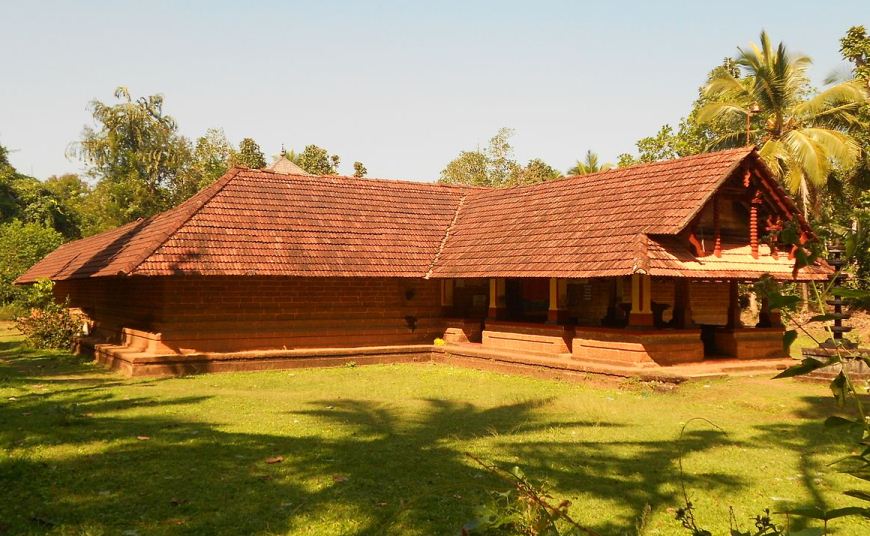
The belief that the idol of Bhagavaty can be never be stolen
The idol of 3 feet height is made of Panchaloha, and it costs more than 1.5 crore Indian rupees. The locals of Muzhakkunnu, Kannur where the temple is situated, believe that the idol can never be stolen. Even if anyone attempt so, Bhagavathy will bring the idol back to temple. Till a few decades back, there was no security guard in the temple.
Till now three attempts have been made to steal the idol, and it returned to temple very soon or later. It happened in the 1980s when Alexander Jacob was working as the ACP, Thalassery and Commissioner of Police, Kannur and most recently his speech went viral over social networking sites.
When the first attempt was made, thieves manage to reach till Vadakkenada. But they got scared and confused, as weight of the idol started increasing. They also felt dizziness and need to urinate and defecate uncontrollably. By that time, time passed by and at dawn break they had no other option left except to leave the idol. For the second attempt, the idol was later obtained nearby roadside in Palakkad with a note, “This idol belongs to Muzhakkunnu. Please return it to the temple”.
In the third attempt, Police got back the idol from a lodge at Kalpetta. Police reached there after receiving a message. Years later, three thieves got caught for some other crime, and they revealed before the police, their three failed attempts to steal the idol. That’s how Alexander Jacob came to know about this. It was later revealed that the power of ‘prathishta karmam’ and ‘tantric vidhis’ are the major reasons behind this.
Now for special puja days, thousands of devotees arrive at the temple, which is around 500 years old. Celebrations are grand during Navarati festival at Mridanga Saileswari temple.
The presiding deity is Sangeeta Roopani – Mridanga Saileswari
The story of the temple’s origin is related to music. It’s situated in Muzhakkunnu village of Kannur district. Though not correct date known, the temple is more than 500 years old. This temple is believed to be the centre (Aarooda Stanam) of all Porkkali temples of Kerala, and one among the 108 parasurama temples in the world. Mridanga Saileswari temple is also one significant as it is one among the 108 Durga Temples.
She also takes the avatars of Kali, Saraswathy and Lakshmi as per beliefs. Before going to battles, kings used to give animal sacrifice (bali) in the den temple situated at the west side of main temple. As the presiding deity is in Porkkali form (Durga going to battle), it was believed that offerings before going to a battle pleases the Goddess. That den temple is not found now, and only its remains found there.
Muzhangiya Kunnu which later came to be known as Mizhavukunnu
Mridanga Saileswari is one among the 108 Durga idols installed by Parasurama. Goddess assumes the avatar of Durga. This goddess is also associated with music. Mridangam is a music instrument used in Devaloka, and also regarded as ‘Mother of Vadya’. Mridanga Shailam is a mountain born in Devaloka (heaven). It’s believed that idol of Mridanga Saileswari appeared (swayambhoo) in the shape of a mridangam and Parasurama installed this divine power here.
There is also one place called ‘Mizhavu Bhagavathy’ in the south side of the temple. It is believed to be the place where Bhagavathy appeared (swayambhoo) in the shape of a mizhavu – a music instrument. Though the place is now filled with anthills, poojas are conducted regularly. Goddess at this place was later installed inside the main temple.
Goddess of music, her music used to echo the hill and that’s why the place got the name, Muzhangiya Kunnu. Later it became Muzhakunnu, and now also known by the name Mizhavukunnu. It’s also said that Mizhavukunnu is the Malayalam word of Mridanga Shailam. Banyan tree with white leaves is present in the temple.
Temple in the present ages
During early ages, it was only a small building with Sree Kovil only. It had a thatched roof made of grass. It’s during the reign of Thampuran, temple was constructed using tile roof and Chuttambalam. The special stone for the idol was brought from Panakadu near Thillankeri by horse transport and later polished using different types of polishes. Cement was not used. Sreekovil was built by using brass and idol with panchalokam. Gold and other precious stones were used to decorate the idol.
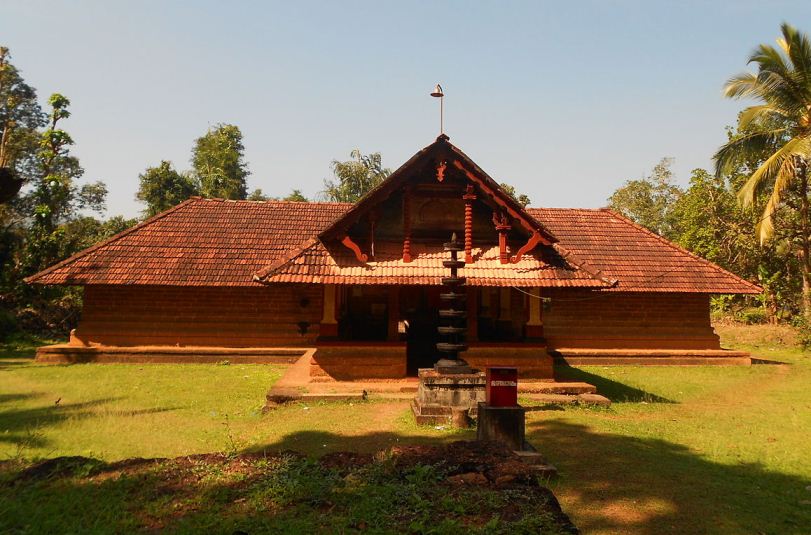
Mridanga Saileswari Temple – Front View
After abolish of princely state, local residents looked after the temple for a while. It was closed at many occasions and poojas were not conducted regularly. It was during that time, three thefts of idol happened. Several poojas, vrithams and yagas including Aghandanaama Yajnam were conducted to get the idol back, following the first theft. Some people grew long hair also. On the 42th day, natives got information about the idol from Palakkad. The idol was stored in treasury and police station for many days. But lamps were lighted and poojas were conducted while idol was stored at police station.
There are many politicians who were ardent believers of Mridanga Saileswari temple. The leading name is K. Karunakaran, who took initiatives to bring the temple under Malabar devaswom board. Jayaram Padikkal and Madhusoodanan too regularly visited the temple during the infamous Rajan case in the late 1980s. Grandkid of famous musician V. Dakshinamurthy conducted his mridangam arengettam here.
Once in Devaprashnam, it was predicted that temple will reach its previous glorious period following renovation. Though efforts were made from local people’s side it was not enough to provide the huge funds. Later, during last state government tenure, the temple was included in Sahasra Sarovar project, and the pond was cleaned. During the monsoon the pond overflowed and very soon the speech of former DGP also surfaced through social media.
As predicted, the temple has now returned back to its prosperous era and glory. Today thousands of people visit the temple every day and offer prayers lighting ghee lamps.
Thiruvakkadi is the main offering here
Thiruvakkadi is a special type of rice prepared using turmeric and coconut. This rice is very special to presiding deity. Annadanam is also special. Everyday Upma and coffee are supplied as breakfast to devotees. Prasadamoott is done on Sundays and Sangram days.
The deity also known as Kuladevatha of Pazhassi Raja
Years ago, Kolathiri King invited Kottayam Thampuran and gave him land and Kovilakam (palace) as prize. He also granted him the space at southern side of the temple to reside. The famous Pazhassi Raja is a member of this branch, as his mother was a descendent of Kottayam Thampuran. Thus he got connected to this famous temple and deity. Later Kovilakams (Palaces) were built at east and west sides.
The temple belongs to descendants of Kottayam King (Ooraalanmaar). Pazhassi Raja worshipped Bhagavathi in ‘Sree Porkkali Bhavam’ (Goddess in fierce form going to battle) inside a secret place of his Kovalakam. That means Goddess in ‘Raudra’ (anger) Bhavam. This famous king known as a great warrior and one of the early freedom fighters from Kerala goes to battles only after worshipping the goddess.
A beautiful picture of goddess is placed at the entry point of main temple now, and a sloga is also printed there. This particular sloga was later used for Malayalam movie, Pazhassi Raja sung by K. J. Yesudas. It’s a Vandana Sloga (prayer song) for Kathakali also. This famous vandana sloka “mathanganana mabjavasaram” was written by Kottayam Rajavu – The father of Kathakali.
Pindari Kalari is linked with Mridanga Saileswari temple and rulers
The famous Pindari Kalari is located at Padinjare Nada (West side) of the temple. Currently the kalari, where Kerala martial arts are taught is owned by Raman Nambeesan who is 72 years old. The Pindari family is known for giving martial arts practice to the members of famous Kottayam palace for more than 7 generations. In short, it has been a tradition for many generations to receive Kalari lessons from Pindari Kalari.
Kings worshipped goddess at temple every day, and on their return they also visited the Kalari to worship Kalari Devatha. Apart from great kings like Pazhassi Raja, the famous ruler of Travancore – Marthanda Varma has also learnt martial arts here. Read here to know the legend of famous Sri Krishna Temple and Ammachi Plavu, Neyyattinkara built by Marthanda Varma.
It’s believed that the prosperity of the temple increases if kings learn martial arts from Pindari Kalari. Also to receive the power of Thampuran (ruler), the prince should visit Kalari and accept Thampuran Pattam (power) from Kalari guru. Also when a new Kalari guru takes power, he should put a dakshina before the ruler. In return, the king will offer a bamboo cane to guru, and utter the word ‘Gurukkale’ three times to complete the rituals.
There are two kalaris there. The main kalari belongs to the members of royal family, and the second one for other students. Till now main kalari is preserved as such, and more than 30 students learn martial arts from second kalari under the guidance of Thillangeri Sukumaran Gurukkal. Daily pooja will be conducted for Kalari goddess. Sankrama Pooja of Dhanu month, Navaratri and Mandala Pooja for 41 days are important. The main kalari will only be opened for annual Thira festival.
The person who does Thira has to do a few rituals at Kumaradhara. He also worships Durga Devi and offers Dhakshina as per temple rituals. Dhakshina is placed by Kalari Guru. If 3 rupees are placed as Dhakshina, 2 rupees will be given back by Bhagavathy and Gurukkal gives it as wages to Thira. It’s usually conducted in the month of March-April.
Legend of Kathakali Thampuran who started lady characters in this art form
As per legends, once a prince was born in Kottayam Royal family with mental disabilities. Though Raja tried to give him lessons under different gurus, the child was not able to pick up. Due to honour problems, the king left the child near a stream distant from his kingdom. Now this place is known as ‘Kumara Dhara’ and Lord Siva is the presiding deity. The story goes like this. As the water from that stream touched the head of young prince, he turned intelligent and also returned back to palace.
This prince later came to be known as Kathakali Thampuran, who wrote several landmark Aattakathas (Kathakali works) including Bakavadam, Kirmeeravadam, Kalyanasaugandhikam, Nivathakavacha Kaalakeyavadam etc. It’s also believed that he wrote all these works in front of the presiding deity. It’s also believed that when he tried to give shape to female Kathakali characters, Goddess appeared in front of confused Kathakali Thampuran in Minukk avatar. She appeared near temple pond and her avatar is still used for female characters (Minukk) of Kathakali art form.
How to reach Mridanga Saileswari Temple?
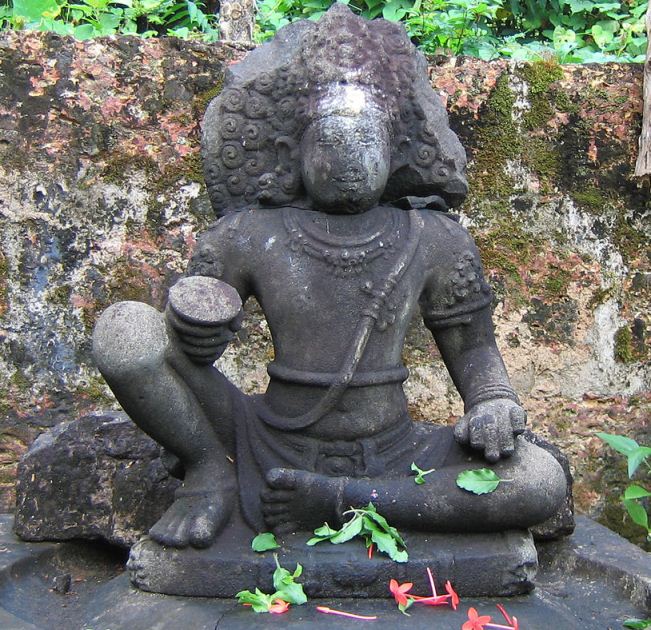
Ayyappa Idol installed at the temple
Situated in Kannur district, the temple can be reached by car or bus. If travelled by car through Kannur-Mattannoor-Uliyil-Thillangeri route, it is 40 kms away from Kannur. Bus is also available in this route.
If you are planning to visit a devi temple during this Navaratri season occasion, Mridanga Saileswari Temple is definitely one of the best choices.
Image source: Wikipedia
Courtesy: Vanitha Magazine






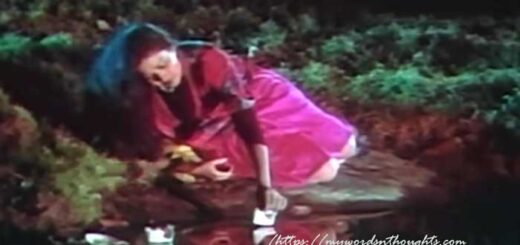
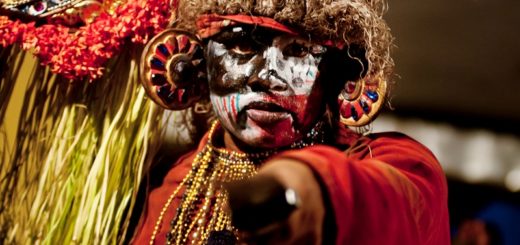

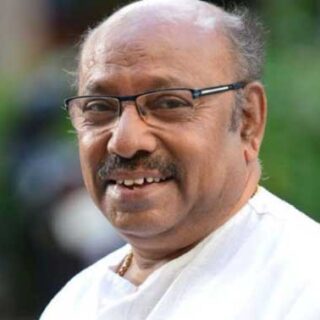






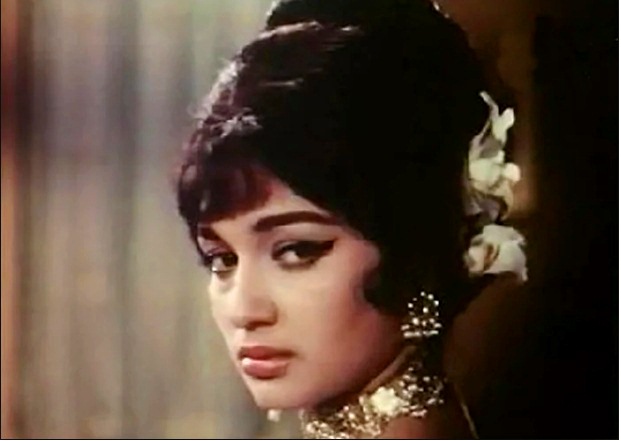
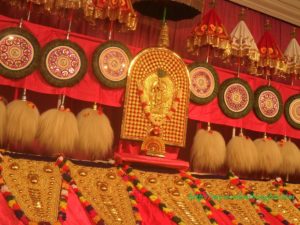
for those who came from long distance (eg. kanyakumari,trivandrum kollam)where to stay
In irrity town there is one Surya Residency.. You will get decent rooms. – i think this is a 3 start holel , restaurant also is there.. Or second option is to go to tellicherry/ or kannur town where n no. of hotels are avaiable.
Not much idea. Sorry 🙂
You can stay in Iritty or Mattannur. There will some reasonable lodging facilities
If u stay in iritty the best family hotel M2h residency payancheri mukku near union bank opposite they provide best food and stay include local transportation also